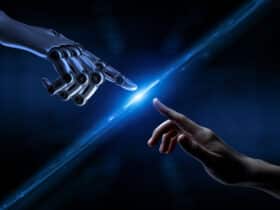The biotech industry is going through a huge transformation, mainly because technology is advancing so quickly. Everything from messing with genes to making drugs is benefiting from super-modern methods and tools.
This is helping researchers and companies do things they never thought they could, making innovation and getting things done way easier. And as we keep moving forward in the 21st century, these technologies combined together are set to change the field even more.

The Role of AI in Enhancing Biotechnological Research
Artificial intelligence (AI) has become a crucial player in the field of biotechnological research. These advanced AI systems excel at analyzing and making sense of the extensive data produced in biotechnological experiments, ranging from genetic sequencing to the outcomes of clinical trials.
For example, by utilizing a large language model, researchers can detect trends and insights much faster and more accurately than human analysis allows. This ability not only improves predictive analysis but also speeds up drug development by forecasting the actions of molecules and the results for patients with impressive accuracy.
Synergy Between AI and Other Technological Innovations
AI is impactful on its own, but it achieves even more when it works together with other tech developments. Take the single cell sorter as an example. These instruments separate and study single cells from a group.
These sorters aren’t powered by AI, but pairing them with AI-based analysis tools enhances their capability to provide detailed interpretations of cellular data. This collaboration boosts progress in fields like disease study and creating new medicines, where knowing how individual cells act is key.
Improving Precision in Genetic Engineering
In the field of genetic engineering, AI significantly boosts the accuracy of tools like CRISPR. AI-driven algorithms predict the results of gene-editing experiments, greatly decreasing the chance of unintended changes, which can result in incorrect genetic modifications. This enhancement in precision is essential for the safe and effective use of gene therapies and has important consequences for the treatment of genetic diseases.
Furthermore, AI is transforming how scientists identify potential unintended editing locations for CRISPR. Through the analysis of large genomic datasets, AI can identify areas that closely resemble the intended target sequence, reducing the likelihood of accidental mutations. This careful method not only improves the safety of gene-editing processes but also speeds up the creation of specific treatments for a range of genetic ailments.
AI in Protein Folding and Structural Prediction
Artificial intelligence plays a crucial role in biotechnology, particularly in forecasting protein structures. Understanding how proteins fold is essential for grasping their functions and their roles in diseases. AI models can now forecast the three-dimensional shapes of proteins based on their sequences of amino acids. This breakthrough is opening doors for developing new drugs and treatment approaches.
Additionally, AI-powered structural predictions allow researchers to delve into protein dynamics with unparalleled precision. By mimicking protein interactions and shape changes, these models provide insights into intricate biological processes like enzyme actions and molecular recognition. This deep understanding sets the stage for creating innovative therapies that are more effective and precise, marking a significant step forward in drug discovery.
Enhancing Bioprocessing with AI
AI also has an impact on bioprocessing, especially when it comes to enhancing conditions inside bioreactors. AI can study data from multiple sensors in real time and then change variables such as temperature, pH level or nutrient supply to ensure product amount and quality are at their best possible levels. This improvement is essential for the production of biopharmaceuticals because making sure these products are consistent and effective is crucial for business success and following rules from regulatory authorities.
Also, AI-powered bioprocessing optimization helps in sustainability by lessening the use of resources and the creation of waste. Predictive analytics can recognize areas for process intensification and resource recycling through AI models, lowering the environmental impact of creating biopharmaceuticals.
AI in Personalized Medicine
In personalized medicine, AI plays a vital role. It sifts through genetic data and patient medical records to craft treatment plans customized to each individual. This not only boosts treatment efficacy but also lowers the chances of unwanted side effects, revolutionizing healthcare.
Moreover, by factoring in live patient input and environmental conditions, AI-powered personalized medicine keeps progressing, providing flexible treatment options that adjust to each patient’s evolving requirements.
Challenges and Ethical Considerations
While AI’s incorporation into biotechnology brings advantages, it also poses challenges. Preserving data privacy stands out as a significant worry due to the personal nature of biotechnological data.
Ethical dilemmas surface, especially regarding consent and the risk of genetic discrimination. Additionally, the regulatory framework lags behind the swift progress of technology, creating vulnerabilities that could be exploited.

Final Thoughts
The integration of AI and emerging tech with biotech isn’t just improving existing methods, but also creating new avenues in science and medicine. Looking ahead, the worldwide AI in the biotech market is projected to see substantial revenue growth, expected to reach hundreds of millions of dollars between 2023 and 2032.
The combination of these tools with traditional biotech methods will undeniably influence future research and treatment, marking the start of a new era of creativity and exploration.


















